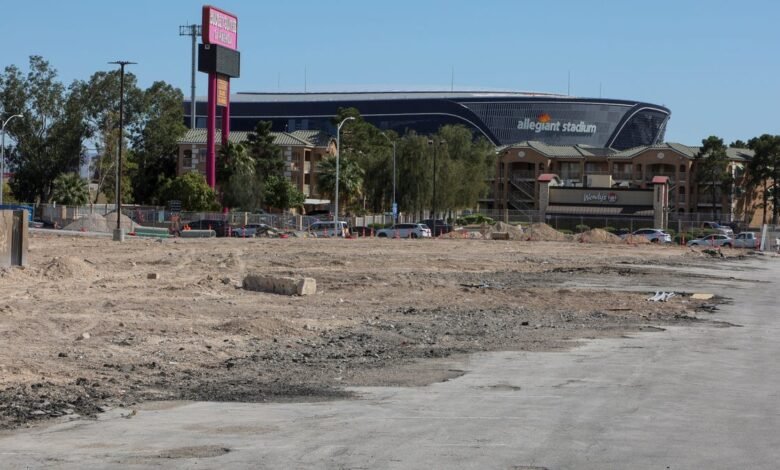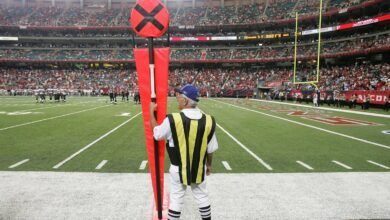Someone’s finally standing up to the Vegas sports juggernaut

A Nevada teacher’s union doesn’t believe that $380 million in public funds that could be put towards education should be used to fund the new home of the Las Vegas A’s, and they’re suing to stop it.
Back in June of 2023, Nevada lawmakers voted on a bill that would flood the A’s proposed stadium in Las Vegas with $380 million of taxpayer money. To sell the deal, those in favor of the funding hired “a small army of lobbyists,” according to The Nevada Independent, who, of course, proceeded to engage in the same old song and dance about bringing more jobs and economic development to the area — the same pitch we hear every time a billionaire owner doesn’t want to pony up his own money for his own business. I guess no one in Nevada got the memo that we stopped buying the grift that stadiums are good for the local economy more than a decade ago. But where the A’s couldn’t convince lawmakers that they should give citizens’ hard-earned dollars to billionaire majority owner John Fisher, it appears they simply paid them to vote “yes” in the form of campaign donations.
But never fear, the Nevada State Education Association is here to stop the process of funneling public funds to rich wonders, or at least get in the way and slow down the process. The state teachers’ union has filed a lawsuit claiming the bill to fund the stadium is unconstitutional, arguing that the entire state is taking on debt that should be the sole responsibility of Clark County, where the A’s want to put a stadium on the Las Vegas strip. The teachers are also arguing that the stadium-funding bills should come to a public vote, rather than allowing lawmakers to cast the deciding ballots.
As always, context is key, and it’s important to note that, in 2016, Nevada lawmakers approved $750 million in public funds for the Raiders’ Allegiant Stadium (again, team owner Mark Davis is worth billions himself). It’s also worth mentioning that Nevada currently ranks 49th out of 50 states in educated citizenry. It also comes in at 49th in educational attainment, 42nd in school quality and 46th in caliber of public school systems. That seems like a much better place to drop $1.1 billion than in the pockets of the billionaires who own the teams. Meanwhile, the Raiders have skyrocketed in value since moving to Las Vegas, from $3.1 billion in 2020 to $6.2 billion in 2023. How much of that value will revert to the local citizenry? Not nearly enough. As the stadium is technically owned by the Las Vegas Stadium Authority, the team pays no property taxes.
Do a Google search for “Nevada schools” and “cutbacks,” and you’re greeted by pages and pages of results, all detailing budget cuts to schools around the state. In 2020, just four years after the state approved three-quarters of a billion dollars in public funding to lure the Raiders to Vegas, the state legislature cut hundreds of millions of dollars to vital state programs, including cutting K-12 education spending by $122 million. In 2021, still facing the fallout of the global COVID pandemic on the state’s revenue, the state’s governor again proposed cutbacks to K-12 and higher education. In 2022, a national report card named Nevada the worst state in the nation when it came to school funding.
This is where we are in America in 2024. Late-stage capitalism has us in such a chokehold that lawmakers, given enough money has been deposited into their campaign’s Venmo, can be legally bribed to look at a billion dollars and decide it’s better spent on a sports team than educating children. After all, there are no luxury suites at Clark County Elementary. No sportsbook (I assume), either. Boring.
Given all the public funds that have been flushed down the toilet on the promise that stadiums will bring jobs and great fortune to local communities, it’s surprising that more groups haven’t challenged the free flow of tax dollars into billionaires’ pockets. According to Smith College economist Andrew Zimbalist, $33 billion in taxpayer money was funneled into building sports stadiums between 1970 and 2020. And, Zimbalist points out, the communities who invest in these stadiums don’t get nearly the return on their investment they anticipate. “Econometric studies on the impact of professional sports stadiums are almost unanimous in their conclusion that they do not promote employment or per capita income growth,” Zimbalist says. “Despite the outsized role they play in U.S. cultural life and in the media, professional sports teams are small- to modest-sized enterprises.” And, Zimbalist continues, depending on the financing arrangements between the team and local government, taxpayers might even take a fiscal loss on the deal.
Of course, when the Nevada legislature approved $750 million in public money to fund Allegiant Stadium, they couldn’t foresee that a global pandemic would devastate the tourism industry, putting a huge dent in their plan to recoup the money by taxing Vegas hotel rooms. But even with the benefit of hindsight, it’s difficult to envision a scenario where dumping money into a sports stadium is preferable to investing in the education of the next generation of citizens. To paraphrase the movie “Dave,” I don’t want to tell some kindergartner he has to go to a subpar school so that sports fans can feel good about a team they can watch on TV in Oakland.
With everything that has befallen teachers over the course of the last eight years, from Critical Race Theory hysteria to COVID and banning books, it seems unfair that our most underappreciated public servants should also have to take up the fight about how Nevada spends its money, but Nevadans should be grateful that someone, somewhere cares about their children’s education. Nevada lawmakers certainly don’t.





